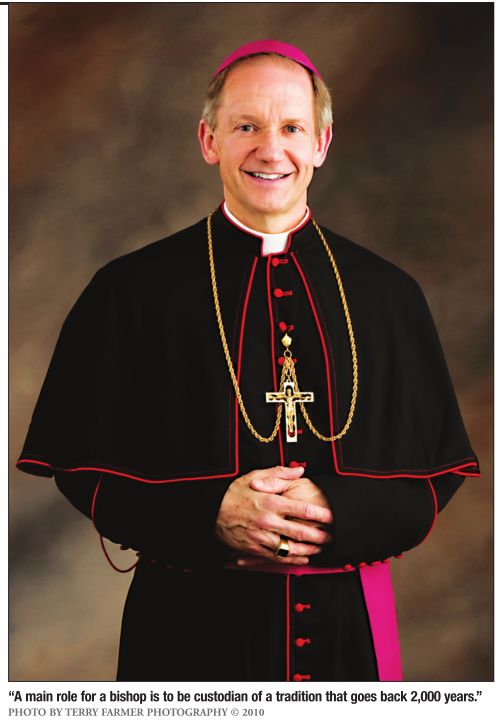
After the late Springfield Mayor Tim Davlin committed suicide a year ago, Paprocki again found himself having to explain things.
The church teaches that life is sacred, that whether to live or die is God’s decision, and suicide was once considered a sin so serious that funeral masses were banned when the deceased took their own lives. The restriction was eased in 1983, although funeral masses can still be denied for people who commit suicide. It is a case-by-case decision.
In Davlin’s case, Paprocki didn’t hesitate. Upon hearing the news, Paprocki says he called the mayor’s mother to offer condolences. She didn’t ask him for a funeral mass; he offered.
“The funeral is as much for the family and friends as it is for the departed person,” Paprocki explains. “Pastorally, I’m the shepherd of the Catholic community here in Springfield and he was the mayor, a very prominent figure and a Catholic – a member of that community. I thought my place was to be with the Catholic community and leading the community at that point.”
Two weeks after funeral services, Paprocki explained his reasoning in a column published in Catholic Times, acknowledging that there had been questions about the propriety of a funeral mass for Davlin and pointing out that Pope John Paul II had lifted the ban.
“My place was to be shepherd of the flock in their time of grief,” Paprocki wrote.
The mayor shot himself the day he was due in court to account for funds in the estate of Margaret Ettelbrick, a cousin who had died in 2003. Davlin was executor, and it was ultimately determined that $340,000 was missing. Davlin had taken most of it for his own use instead of turning it over to Catholic Charities, contrary to Ettelbrick’s will.
Davlin’s family donated the remainder of the mayor’s campaign fund, more than $220,000, to the church. Under the law, Catholic Charities could still have demanded $340,000 from Davlin’s estate. Instead, the diocese settled for $250,000, effectively leaving $90,000 on the table.
While Paprocki says that there was no quid pro quo when the Davlin family donated campaign funds, that money, nonetheless, made a difference.
“I got sort of an unspoken message that it was their own sense of equity and fairness in making that donation, and so I took it in that sense as well,” the bishop says.
Between explaining himself on high-profile matters, Paprocki leads the day-to-day life of a bishop, lawyer, marathon runner (he finished 531st out of 1,330 finishers with a time of 4:08:39 in the Kansas City Marathon last fall) and, Grossman says, a man who is making plans to earn a master’s degree in business administration. Somehow, he finds time for matters large and small.
“You can imagine a person in his position must get asked a favor or for something a million times a day,” Grossman says. “He always, always, always takes time for people.”
Including for members of the Sacred Heart-Griffin hockey team, which won its first-ever championship last season, when Paprocki served as the squad’s goalie coach during his first year in Springfield. The bishop attends about 70 percent of the team’s practices and games, says Rocco, the team’s director, and he commands respect by blocking 60-mph shots by college-bound players.
“He can play,” Rocco says.
Contact Bruce Rushton at [email protected].